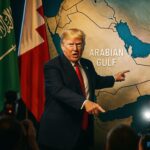In the mountainous regions of northern Iraq, particularly within the Kurdistan Region, Turkey has significantly expanded its military presence under the pretext of combating the Kurdistan Workers’ Party (PKK). This expansion has led to the establishment of a de facto “Forbidden Zone”, deeply affecting local communities and raising concerns about sovereignty, human rights, and regional stability.
Turkey’s Military Expansion in Northern Iraq
Turkey’s military operations against the PKK have resulted in the construction of numerous military installations within Iraqi territory. As of December 2024, satellite imagery and on-the-ground reporting indicate that the Turkish military has established at least 136 fixed installations across northern Iraq, connected by approximately 660 kilometers of roads. This network effectively grants Turkey de facto control over more than 2,000 square kilometers of Iraqi land.
While Turkey justifies these actions as necessary for national security, the scale and permanence of the military presence suggest a strategic entrenchment. “This is 100% a form of occupation of Kurdish lands”, said Sherwan Sherwan Sergeli, a farmer in Sergele who has lost access to part of his farmland.
Humanitarian Impact on Local Communities
The militarization of northern Iraq has had profound effects on local populations. Villages like Sergele, once reliant on agriculture and foraging, now find themselves surrounded by Turkish military bases. The construction of a base near a dam, for instance, has rendered the village’s water source off limits.
Residents like Salam Saeed in Kani Masi describe a life under surveillance and fear. “The moment you get here, you will have a drone hover over you. They will shoot you if you stay”, he told reporters. He has been unable to cultivate his vineyard for three years. Much of the surrounding land has been charred by repeated shelling.
According to Community Peacemaker Teams, hundreds of civilians have been killed in air and drone strikes. One such victim was 24-year-old Alan Ismail, a cancer patient, killed in an airstrike during a family trip. His father, Ismail Chichu, lamented: “They [the Turks] have no rights to kill people in their own country on their own land”.
Geopolitical Ramifications
Turkey’s actions have strained its relationship with Baghdad and complicated the already fragile regional order. Although Iraq publicly denounces the Turkish presence, in practice, it has made concessions. A 2024 memorandum of understanding between Iraq and Turkey outlined joint efforts against the PKK but failed to impose limits on Turkish deployments.
The Kurdistan Regional Government (KRG), particularly the ruling Kurdistan Democratic Party (KDP), has been less confrontational. Hoshyar Zebari, a senior KDP figure, argued: “They are not harming our people… Their sole goal is the PKK”. This position aligns with the KDP’s long-standing rivalry with the PKK and reflects the party’s close economic ties with Ankara.
However, Kurdish authorities have been accused of shielding Turkey from accountability. In the case of Alan Ismail, local courts closed the investigation citing an “unknown” perpetrator, and his death certificate attributed his death to “explosive fragments” without naming a cause.
A Final Note
Turkey’s expanding military footprint in northern Iraq, under the guise of combating the PKK, has led to significant humanitarian and geopolitical consequences. The establishment of the “Forbidden Zone” has disrupted communities, displaced civilians, and directly undermined Iraq’s sovereignty by limiting the Iraqi government’s ability to access, control, and govern its own borderlands.















